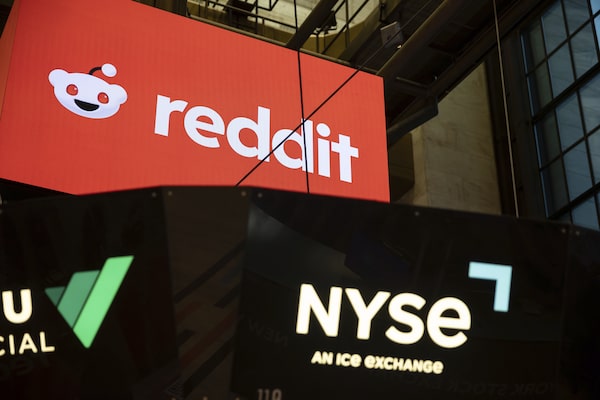
Reddit and Trump Media are the first social media companies to begin trading publicly in the last five years.Yuki Iwamura/The Associated Press
When Reddit Inc. RDDT-N went public last week, it felt for a moment like 2021 all over again.
The social media company’s initial public offering would have fit right in back then, when unprofitable growth companies with inflated valuations went public to great acclaim on a weekly basis.
But the IPO market has been graveyard quiet for two years now. U.S. companies have been going public at one-fifth their normal pace. The TSX hasn’t had a single IPO in more than a year.
Where are all the IPOs? This is supposed to be a bull market, maybe even a stock bubble. These things typically spawn IPOs at a furious pace.
A couple of forces are behind the dry spell. The first is that more and more companies are taking a pass on going public, in favour of private sources of funding, which is thinning out the ranks of the stock market year after year. The second is more of a temporary backlash to the pandemic IPO binge.
In 2021, IPOs on major U.S. exchanges raised nearly US$120-billion – a quadrupling over prepandemic norms, according to data compiled by University of Florida professor Jay Ritter, who studies IPOs.
The market’s appetite for IPOs was ravenous amid a retail trading mania fuelled by pandemic stimulus. The average IPO gained more than 30 per cent in its first day of trading in 2021.
The performance of those stocks ever since then has generally been horrendous. Consider some egregious examples.
Electric vehicle startup Rivian Automotive Inc. RIVN-Q had the biggest IPO of 2021. It raised nearly US$12-billion from investors eager to get in on the cleantech boom. It’s currently trading 86 per cent below its day-one price.
Rental car company Hertz Global Holdings Inc. HTZWW-Q managed to raise US$1.3-billion in a “re-IPO,” after emerging from bankruptcy earlier in 2021, only to see its stock decline by 73 per cent to date from its IPO price.
Robinhood Markets Inc., the investing platform at the heart of the day-trading craze, is trading 47 per cent below its debut price. And crypto exchange Coinbase Global Inc. is down by 30 per cent from its opening day, even after the latest resurgence of crypto assets.
Canadian investors were not spared the opportunity to lose money on IPOs. A wave of Canadian companies went public in 2021, including more than a dozen tech names, most of which are trading at steep losses or have vanished from public markets altogether.
Telus International (Cda) Inc. TIXT-T, a spinoff of the Canadian telecom, was the largest of the bunch. It raised $1.4-billion in early 2021. Its shares are down by 66 per cent since then.
The past few years have been a miserable experience for most long-term backers of these companies, and investor confidence in IPOs has suffered for it.
When stock markets in general tipped into a downturn in early 2022, a long winter descended on the IPO market from which it has yet to emerge.
Even though stock benchmarks have since made a full recovery, with even the S&P/TSX Composite Index now in record territory, corporate North America has had little desire to test the IPO market. Until Reddit, that is, which popped by nearly 50 per cent on its first day of trading, suggesting there is some pent-up investor demand.
Is Reddit destined for the IPO list of shame? Maybe it will become the next darling tech stock. Its revenues were more than US$800-million last year, up by roughly 20 per cent. And the company has tapped into enthusiasm for artificial intelligence, with plans to use its conversation data to help train AI models.
But the company has a long way to go before it grows into its US$8-billion valuation. It has never turned an annual profit and expects to lose money “for the foreseeable future,” according to a regulatory filing.
“Reddit’s IPO marks the return of the junk IPO,” David Trainer, chief executive of investment research firm New Constructs, wrote in a note. “Reddit reminds us of the fast-growing but highly unprofitable IPOs we saw in 2021.”
Few expect Reddit’s successful debut to open the floodgates in the IPO market. While stocks are on a good run, companies can generally get higher valuations in the private realm.
“The rise of private equity has undoubtedly played a part,” Craig Basinger, chief market strategist at Purpose Investments, wrote in a recent report. “Companies are now staying private much longer in their growth stages and using private funding sources.”
Plenty of companies these days are opting out of the burdens of going public. Publicly traded companies face enormous disclosure requirements and financial oversight, in addition to scrutiny from analysts and activist investors.
IPOs have been trending lower for several years, while corporate takeovers and mass delistings have systematically eroded the rosters of North American stock markets.
Just since the end of 2008, the number of corporate listings on the Toronto Stock Exchange has declined by roughly 40 per cent. Canadian stocks are now outnumbered by structured products, like exchange-traded funds.
The junk IPO boom of 2021 was but a blip on an otherwise downward trajectory.